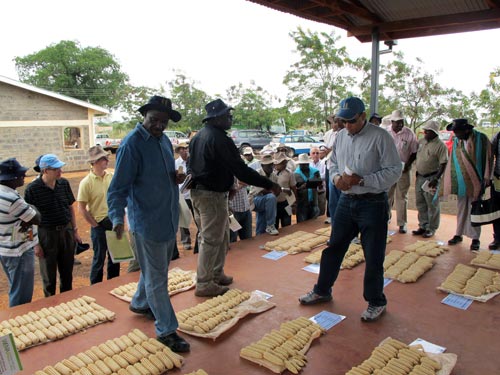 During 4-8 February 2013, stakeholders of the Water Efficient Maize for Africa (WEMA) project gathered in Nairobi, Kenya, for the Fifth Review and Planning Meeting to discuss achievements and challenges of the recently concluded WEMA Phase I (2008-2013) and to plan for the second phase of the project (2013-2017) which begins in March this year. In the past four years, WEMA has made several key achievements, including the successful application and approval of permits to conduct confined field trials for transgenic varieties in Kenya, Uganda, and South Africa. Kenya and Uganda are now in their third year of trials, South Africa in its fourth. The project has also managed to submit conventional drought tolerant maize hybrids into the national performance trials in Kenya. “It is expected that farmers will have these WEMA conventional maize seeds by 2014,” says Denis Kyetere, African Agricultural Technology Foundation (AATF) executive director. CKH110078, one of the hybrids developed from the Drought Tolerant Maize for Africa (DTMA) materials, is in its final stage of approval in Kenya.
During 4-8 February 2013, stakeholders of the Water Efficient Maize for Africa (WEMA) project gathered in Nairobi, Kenya, for the Fifth Review and Planning Meeting to discuss achievements and challenges of the recently concluded WEMA Phase I (2008-2013) and to plan for the second phase of the project (2013-2017) which begins in March this year. In the past four years, WEMA has made several key achievements, including the successful application and approval of permits to conduct confined field trials for transgenic varieties in Kenya, Uganda, and South Africa. Kenya and Uganda are now in their third year of trials, South Africa in its fourth. The project has also managed to submit conventional drought tolerant maize hybrids into the national performance trials in Kenya. “It is expected that farmers will have these WEMA conventional maize seeds by 2014,” says Denis Kyetere, African Agricultural Technology Foundation (AATF) executive director. CKH110078, one of the hybrids developed from the Drought Tolerant Maize for Africa (DTMA) materials, is in its final stage of approval in Kenya.
Emily Twinamasiko, Uganda’s National Agricultural Research Organization director general and WEMA Executive Advisory Board chair, was pleased with the achievements made in 2012 and commended all teams and the operations committee for their great efforts. Natalie DiNicola, Monsanto vice president for Africa and Europe, commented on the indicators of success: “The project will never be successful until the farmer has a product to plant and options to choose from.” Getting the seed to the farmers was stressed also by Ephraim Mukisira, Kenya Agricultural Research Institute (KARI) director, who called for speedy deployment of the varieties: “KARI wants to see the product with the farmer. The scientists must work hard so that impact can be seen and be seen today.”
B.M. Prasanna, Global Maize Program director, thanked Monsanto for donating the drought tolerant and Bt genes. “This is a tremendous opportunity to address some of the biggest challenges to African smallholder farmers [drought and stem borer infestation]. MON810 presents yet another great opportunity for WEMA to tap into the products from the Insect Resistant Maize for Africa project to develop a product that addresses many of the insect related constraints.” He added that new but exciting challenges were posed by maize lethal necrosis, particularly because it has allowed the WEMA team to assure partners that the materials being produced are resistant to the disease. During a visit to trials at KARI-Kiboko, stakeholders observed WEMA varieties, many of which have outperformed some of the best local hybrid checks on the market. They also visited the confined field trials for Bt MON810 and drought tolerant MON87460 that are in their first and fourth seasons of trials, respectively.
Shifting attention from successes to challenges, Stephen Mugo, CIMMYT principal scientist and co-chair of the WEMA Product Development team, spoke of the major lessons learnt by the team in Phase I that are crucial for the success of the second phase: continuous training in trials modernization and modern breeding techniques is necessary, as is a good quality assurance program for the exchange of germplasm between the private and public sectors to minimize the risk of inappropriate germplasm exchange. The stage is now set for Phase II after the meeting streamlined WEMA II milestones and developed the WEMA II 2013 work plans.
Lawrence Kent from the Bill & Melinda Gates Foundation noted that “with great privilege comes lots of responsibilities. We therefore expect great success from WEMA.” This sentiment was shared by other stakeholders, who were impressed by the achievements of Phase I and thus have high expectations for Phase II. “WEMA continues to be a success because of the combined and dedicated efforts within the partnership: the national agricultural research systems, CIMMYT, Monsanto, and AATF. All these partners have continued to work together, celebrating project gains and resolving any challenges together for the good of the larger goal and promise to smallholder farmers, a promise of food security and better livelihoods,” stated Kyetere. “A food secure continent is among the greatest inheritance and legacy we can leave the generations that are coming after us, our children and to our children’s children.”
 Climate adaptation and mitigation
Climate adaptation and mitigation 
